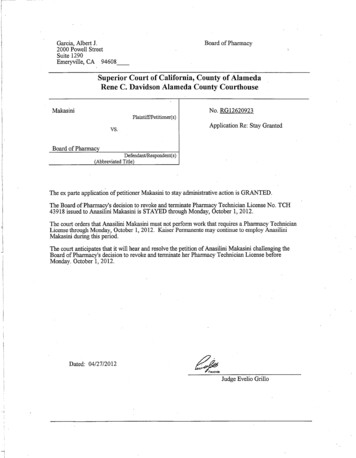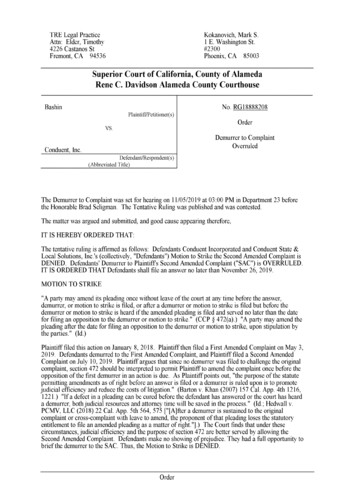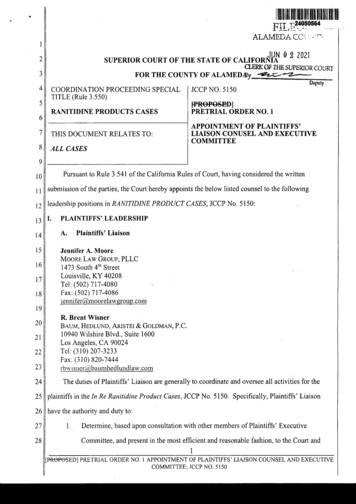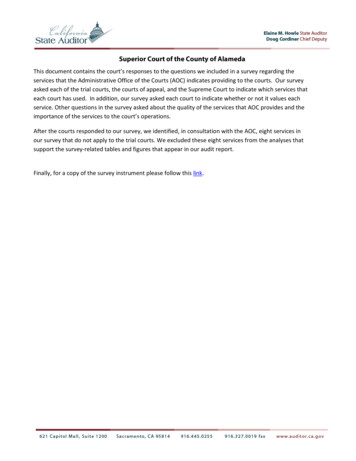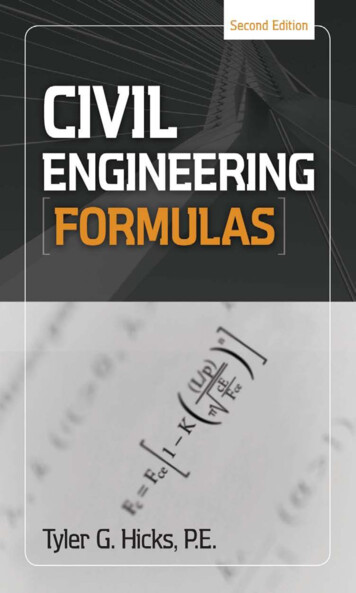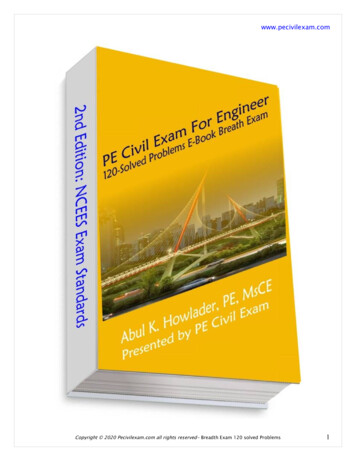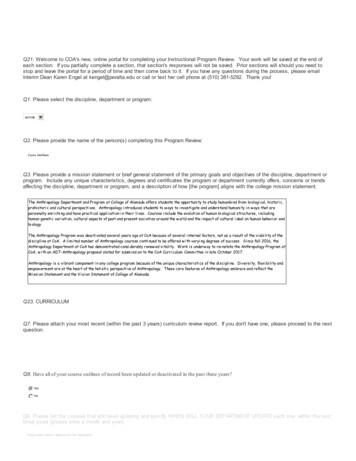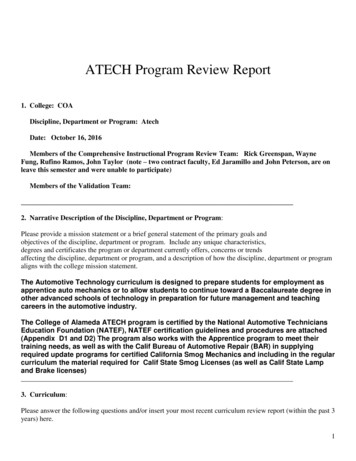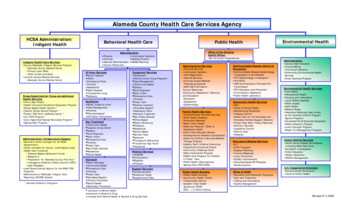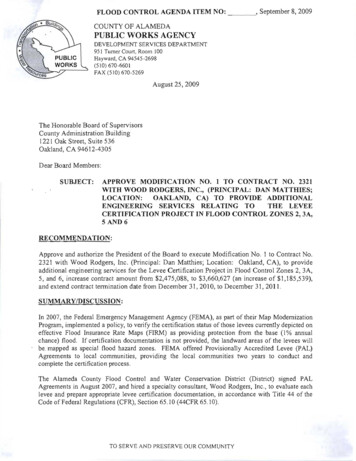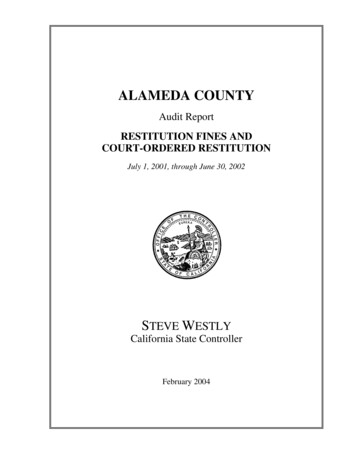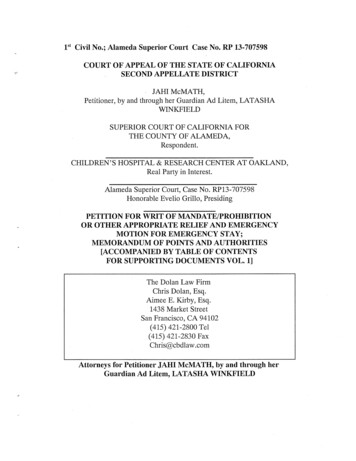
Transcription
lst Civil No.; Alameda Superior Court Case No. RP 13-707598COURT OF APPEAL OF THE STATE OF CALIFORNIASECOND APPELLATE DISTRICTJAHI McMATH,Petitioner, by and. through her Guardian Ad Litem, LATASHAWINKFIELDSUPERIOR COURT O CALIFORNIA FORTHE COUNTY OF ALAMEDA,Respondent.CHILDREN'S HOSPITAL &RESEARCH CENTER AT OAKLAND,Real Party in Interest.Alameda Superior Court, Case No. RP13-707598Honorable Evelio Grillo, PresidingPETITION FOR WRIT OF MANDATE/PROHIBITIONOR OTHER APPROPRIATE RELIEF AND EMERGENCYMOTION FOR EMERGENCY STAY;MEMORANDUM OF POINTS AND AUTHORITIES[ACCOMPANIED BY TABU OF CONTENTSFOR SUPPORTING DOCUMENTS VOL. 1]The Dolan Law FirmChris Dolan, Esq.Aimee E. Kirby, Esq.1438 Market StreetSan Francisco, CA 94102(415)421-2800 Tel(415)421-2830 FaxChris a cbdlaw.comAttorneys for Petitioner JAHI McMATIH,by and through herGuardian Ad Litem, LATASHA. WINKFIELD
IV.PETITIONER ASKS THAT THE LOWER COURTPROCEEDINGS BE STAYED . 21CONCLUSION .22CERTIFICATION UNDER CRC RULE 14(c)(1) . 23
TABLE OI ' AUTHORITIESState Cases',' BaYt itzg v. SuperioY Court(1984)163 Cal.3d 186 . 17, 18, 19Conservatorship ofDrabick(1988)200 Cal.App.3d 185 . 15, 16, 17Gilbert v. City ofSa nnyvale(2005)130 Ca1.App.4th 12b4 . 20In conseYVato ship of Valarie N.(1985)40 Ca1.3d 143 .16,171Vle nphis Liglzt, Gas and Watef- Divisiotz v. Craft(1978)436 U.S.1 . .20Oceanside U ziofz School Dist. v. Superior Coatirt(1962)58 Cal.2d 180 .23Palay v. Superior Court(2 d Dist. 1993)18 Cal.App.4th 919 . 22.People v. Sutton (1993)19 Cal.App.4th 795 . 20-21Save-On Drags, I zc. v. Sacperior Court(1975)15 Ca1.3d 1 .22federal CayesPa e sKeatira v. Office of Tlir-ift Supervision (9th Cir. 1995)45 F.3d 322,324 .23Sectcrities &Exchange Comm'n v. Dresser Indus(D.C. Cir. 1980)628 F.2d1.368 .23
their staff.On December 9, 2013, MCMATH had a tonsillectomy performed atCHO.Following the tonsillectomy MCMATH began to bleed excessivelyout of her mouth and nose. Within minutes of excessively bleeding, whileher family members pled with the hospital staff for help, MCMATH wentinto cardiac arrest and later went into a coma. MCMATH was put on aventilator on December 9, 2013.On December 11, 2013, Dr. Shanahan, a physician from CHO,declared that MCMATH was brain dead. Dr. Heidersbach, another CHOphysician verified Dr. Shanahan's findings. The family was asked shortlyafter these findings to allow CHO to remove MCMATH from life supportbased on Health and Safety Code, Section 71 0. At this point, PlaintiffLATASHA WINKFIELD,the mother of MCMATH,demanded her child'smedical records, a second independent opinion, and for her daughter to bemaintained on life support. CHO did not honor WINKFIELD's requests.On December 20, 2013, Plaintiff WINKFIELD,filed a verifiedpetition and ex parse application in the Superior Court of Alameda.WINKFIELD requested an Order to (1) authorize the Petitioner{LATASHA WINKFIELD)to make medical care decisions for MCMATHand for an injunction. preventing 1Ze pondent from withholding life support-2-
from MCMATH.The lower Court set the application for hearing the sameday, at 1:30 p.m., in Department 31. The Court asked that CHO submitopposition papers after the filing was made in the morning.At the hearing, which for the most. part took place in chamberswithout a court reporter, CHO argued that pursuant to Health and SafetyCode, Section 7180, MCMATH was brain dead. In support of their positionCHO submitted the Declarations of Robert Heidersbach, MD,SharonWilliams, MD,and Robin Shanahan, MD. Of these three physicians, Dr.Hidersbach and Dr. Shanahan were doctors who examined Jahi and testifiedby way of declaration that Jahi suffered irreversible cessation of allfunctions of her entire brain, including her brain stem. CHO argued that thetwo doctors meet the requirement of Health and Safety Code Section 7181.1During oral arguments on December 20, 2013, over an objection byReal Party in Interest's counsel., the court found that Drs. Heidersbach andShanahan did not satisfy the requirements of Health grad Safety CodeSection 7180 and 7181. Both of these doctors indicated in theirDeclarations, respectively, that they were "a member in good standing ofthe medical staff at Children's Hospital and Research Center at Oakland."Further, the Court found both of the physicians had hospital privileges at1. Health atzd Safety Code Section 71.81 states that a diagnosis of brain deathrequires confirmation of the findings by a second, independent physician.3
At the December 20, 2013 hearing, the Court ordered the parties tomeet and confer regarding an independent physician to examine MCMATHand her medical records pursuant to Health and Safety Code Section 7181.After a brief discussion the parties agreed to a list of five physiciansaffiliated with the University of California San Francisco Medical School.The lower court then ordered, on December 20, 2013 that CHO betemporarily restrained from changing MCMATH's level of medical supportand continued the hearing until December 23, 2013. On December 23,2013, the parties informed the Court that all five physicians had declined tooffer a second opinion pursuant to Health and Safety Code Section 7181.As an alternate, the parties agreed to Paul Fisher, MD,the Chief of ChildNeurology for the Stanford University Medical Center. Counsel forMCMATH's family at this hearing also requested that Dr. Byrne, beallowed to examine and provide an opinion on her status. The Courtdeclined this request.On December 23, 2013, an Order was made appointing Dr. Fisherthe independent section 7181 physician. On December 23, 2013, Dr. Fisherexamined MCMATH pursuant to the Order. On December 24, 2013, duringa closed session, testimony was received from Dr. Fisher and Dr. Shanahan.
The Court also received into evidence the following documents: Exhibit 1(Dr. Fisher's examination notes); Exhibit 2(Guidelines for Determinationof Brain Death in Infants and Children: An Update of the 197 Task ForceRecommendations); Exhibit 3(Pediatrics, Official Journal of AmericanAcademy of Pediatrics, August 28, 2011, Guidelines for Determination ofBrain Death in Infants and Children: An Update of the 1987 Task ForceRecommendation); Exhibit 4(Table 3 of Exhibit 3); Exhibit 5 (Checklist,Brain Death Examination for Infants and Children); Exhibit 6(ShanahanDeclaration filed 12/20/13), Exhibit 7(Consultation and Examination notesof Robin Shanahan MD dated 12/11/13). The Court later augmented therecord and included the vita curriculas of Dr. Fisher and Dr. Byrne asExhibit 8 and 9 respectively.Counsel for the Petitioners was given the opportunity to crossexamine Dr. Shanahan, but because he had just received. the completedrecords on December 23, 2013, and had not had time to review themcompletely nor have an expert review them, he requested additional time tocomplete an effective cross examination. The lower court denied thisrequest, and then took the mater under submission. during a brief recess. Thecourt later ruled to dissolve the TRO effective December 30, 201.3, allowingthe parties time to appeal.—5—
If this relief is not granted, the minor Petitioner will sufferirreparable harm at 5:00 .m. todaX. Apost-judgment appeal will neverrestore to her the harm.she will suffer from the forced removal of her lifesupport and the violations of her constitutional rights.PETITION FOR WRIT1.Petitioner JAHI MCMATH,PLAINTIFF, by and through herguardian ad litem, LATASHA WINKFIELD, are the plaintiffs in a suit nowpending in the Respondent Superior Court of Alameda County, entitledLATASHA WINKFIELD, the mother ofJal2i McMath, c Minor vs.Childre z's Hospital of Oakland, et al., bearing Alameda Superior CourtCase No. RP13-707598. That action was commenced by Petition. filed byPetitioner on December 20, 2013, a true and correct copy of which appearsas Exhibit 1 to the Supporting Documents {hereinafter "SD").2.On December 20, 2013, Petitioner filed an Ex ParteApplication with the Court pursuant to Probate Code section 3200 et seq.and 4600 et seq., seeking an order (1) authorizing the petitioner(MCMATH's mother) to make medical care decisions for MCMATH,andfor an injunction to prohibit Respondent CHO from withholding lifesupport. A true and correct copy of the Ex Parte appears as Exhibit 2 to the'l'
3.The Court after ordering an independent examination ofMCMATH by a mutually agreed upon physician, denied .Petitioner'srequest to continue life support on December 23, 2013 finding clear andconvincing evidence established tl-jat MCMATH was brain dead pursuant toHealth and Safety Code Section 7180, et. seq. The court gave the partiesuntil 5pm on December 30, 2013 to appeal the findings. A true and correctcopy of the Ex Parte Order appears as Exhibit 3.4.The action of the Respondent Superior Court in denyingMCMATH continued life support violates her Freedom of Religion andPrivacy Rights. Here MCMATH's Guardian Ad Litem requested atracheotomy tube and a gastric rube 'oe installed to allow her to transport herdaughter to a facility who would take her. The Court refused to grant thisrequest, or to extend the obligation to the hospital that caused this horribleoccurrence to find another environmenti where Jahi could be transported to.5.The actions of the Respondent Superior Court violated Jahi'sDue Process rights by allowing hearing when CHO failed to provide Jahi'srecords to Jal1i's counsel until the day of hearing, which severely limitedcounsel for the Petitioner to the extent he could cross examine Dr.Shanahan, to determine if the testing she did was within the scientificallyexpected perimeters, The records that were produced were limited and were—7—
not the entire set of MCMATH's records. Further, Dr. Shanahan could nottestify, based on the records she had, as to what medications MCMATHwas on that could have disqualified the examination she performed.6.Petitioner has no plain, speedy or adequate remedy at lawother than the relief sought in this petition. Petitioner may seek review of itonly by extraordinary writ or by appeal.from a final judgment disposing ofthe entire action after the action has been fully tried. Obviously, MCMATHdoes not have time for a trial on the merits of this issue, as her life supportwill be discontinued at 5:00 p.m. today. There is a facility ready to takeJahi, provide for her care and transport in New York as indicated. inPetitioner's Evidence in Support of this Writ. Also, new facts were foundby another examining doctor that indicates that Jahi is not sufferingirreversible brain damageCONCLUSIONWHEREFORE,Petitioner prays as follows:1.That this Court issue a Peremptory Writ of Mandate and/orProhibition directing the Respondent Superior Court to set aside andvacate its order dated December 26, 20132.That this Court issue an alternative Writ of Mandate and/orProhibition commanding the Respondent Superior Court to show
cause at a time and place to be specified by this Court why aPeremptory Writ should not issue compelling the RespondentSuperior Court to set aside and vacate its order granting, anddirecting the Respondent Superior Court to grant said motioninstead;3.That this Court award Petitioner costs of this proceeding; and,4.That this Court grant Petitioner such. other and further relief as theCourt may deem just and proper including staying the lower court'sproceedings.THE DOLAN LAW I 'IRMDATED:December 30, 2013ByChristopher I)o1 ,Esq.Aimee Kirby, Esq.Attorneys for Petitioner
VERIFICATION OF COUNSELI, CHRISTOPHER DOLAN,declare:1. That I am an attorney at law licensed to practice before.all courtsof the State of California. I am the principal in the Dolan Law Firm, thecounsel of record for Petitioner JAHI MCMATH,PLAINTIFF, by andthrough her guardian ad litem LATASHA WFNKFIELD in the presentaction Alameda Superior Court Case No. RP 13-707598.2. I make this Verification as attorney for Petitioner because I amsnore familiar with the proceedings in this action and the facts alleged in thepresent Petition than are Petitioners/Plaintiffs. The facts set forth herein arewithin my personal knowledge, excepting those stated to be on informationand belief.3. I have read the foregoing Petition for Writ of Mandate And/OrProhibition and know the contents thereof. The allegations thereof are trueand correct to my knowledge.4. Attached are true and correct copies of exhibits, includingdeclarations, in support of this brief.I declare under penalty of perjury that the foregoing is true andcorrect and that this Verification was executed on this 30"' day ofDecember, 2013, at San Francisco, California. gChristopher DulaDeclarant
LEGAL ARGUMENTI.INTRODUCTIONMs. Jahi McMath, 13, is a patient at respondent Children'sHospital, California. On December 9, 2013,she underwent an electivetonsillectomy and adenoidectomy. Dr. Frederick Rosen was the operatingsurgeon and Dr. Thi Nguyen. is MCMATH's pediatrician. Originally thesurgery was uneventful and MCMATH awoke from sedation in therecovery room speaking with her mother, Petitioner LATASHAWINKFIELD asking for a popsicle. Not long thereafter, MCMATH wastaken to the ICU and her mother was told to wait several minutes whilethey fixed her IV.After being told several times that it would just be another 10minutes, approximately 25-45 minutes after MCMATH was. brought intothe ICU, WINKF'IELD went back and found her daughter sitting up in bedbleeding from her mouth. It was evident that this had been transpiring forsome time. The nursing staff said "it was normal" and the mother stayedbedside as the bleeding grew increasingly worse. The nurses gaveWINKFIELD a cup/catch basin for MCMATH to bleed from her mouthinto. WINKFIELD asked for assistance and was told that this was normaland was given paper towels to clean the blood off herself and MCMATH,
The bleeding intensified to where copious amounts of blood were beingexpelled from MCMATH's mouth and then nose. MCMATH's stepfatherwas also present and assisted in the attempts to stem/collect the blood.Again, WINKFIELD asked for assistance, and a doctor, and wasanly given a bigger container to collect the blood and, later, a suctiondevice to suction the increasing volume of blood. The stepfather continuedto suction while the mother went and got her mother, a nurse, to take overfor her. The grandmother saw what was happening and made multiplerequests, and then a loud demand,for a doctor.MCMA' 'H shortly thereafter suffered a heart attack and fell into acomatose state. She later was pronounced "brain dead" yet her heart stillbeats, her kidneys function, she reacts to touch, and she appears to bequietly sleeping. No one from CHO has explained to Petitioner why thismassive bleeding happened or was allowed to continue to the point whereit caused a heart attack. and brain damage. MCMATH is currently aided bya ventilator which provides her physical body life-support. If the ventilatoris removed; MCMATH dies as her heart will stop beating without a supplyof oxygen.MCMATH's care is now managed by a team of doctors atChildren's Hospital Oakland under the supervision of the Chief of
Pediatric Medicine, Vice President of Children's Hospital, RespondentDavid Durand M.D. Dr. Durand has expressed that he speaks forChildren's Hospital Oakland as it relates to the plan of care for MCMATH.He is the most senior physician who met with the mother, father,stepfather, uncle and grandmother on December 19, 2013, indicating thatChildren's Hospital Oakland intended to remove Jahi from life support"quickly""meaning not days weeks or months." In that meetingPetitioner's request to not take action. until after Christmas was summarilyrejected as was a request that she could be given 2 court days prior noticebefore disconnecting life support so she could seek a restrainingorder/injunction.The Petitioner requested, on December 17, 2013, that Respondentsprovide her minor child MCMATH with a feeding tube, to provideessential hydration and nutrition as well as all other life sustaining careincluding antibiotics and other medicines to continue to support thefunctions of her organs and to prolong her life. She also requested thatRespondents continue to provide respiratory support in the form of aventilator which is currently attached to MCMATH through a breathingtube. On December 19, 2013, Children's Hospital Oakland, through Dr.Durand, told Petitioner that he will not authorize a feeding tube and that he—13—
wishes to remove MCMATH from life support emphatically tellingPetitioner, that there is no life support being provided because MCMATHis "dead, dead, dead, dead.i2II.STATEMENT OF FACTSA.Petitioner JAHI MCMATH,then 13 Years-Old, Suffers aMassive, Life-Altering Brain InjuryBecause of the Defendant's Negligence.On December 9, 2013, after a routine procedure to removeMCMATH's tonsils, she began bleeding immensely, went into cardiacarrest and slipped into a coma. (See Exhibit 1.) At issue here was whetherthe hospital had an obligation. to honor MCMATH's mother's wishes to (1)find a hospital where MCMATH could be transported to, and (2)install thefeeding tube and tracheotomy tube as fundamental. to MCMATH's right toprivacy and free exercise of religion. In addition, Petitioner asks this Courtto examine whether due process was afforded to MCMATH when. thedoctor that made the first determination of her being brain dead did notbring in the file and could not testify to key issues that effected thereliability of her opinion.2. The Petitioner emphasizes that Children's Hospital Oakland, thought thesetreatments, that they. now wish to deny, were appropriate when. they first administeredthem less than two weeks ago. Rather than being a professional medical judgment, thedecisions of Children's Hospital Oakland and Dr. Durand to discontinue treatment arearbitrary in these circumstances,
III.ARGUMENTA.The Uniform Death Act as Codified under Health andSafety Code Section 7180 violates the Petitioner'sFreedom of Religion and Privacy as guaranteed by theCalifornia Constitution.In the case of Conservatorship ofDrabick(1988)200 Cal.App.3d185, the court, addressed the issue of whether Drabick, who suffered a braininjury in a car accident, and had. been in a nursing home, unconscious and ina persistent vegetative state for five years, would be allowed to die basedon his conservator's decision to withhold medical treatment. Drabick'sconservator sought a petition to withhold life support. The trial. court deniedthe petition. The Appellate Court reversed detailing a citizen's rights todictate his or her medical treatment. Although Drabick dealt with asituation wherein. a conservator sought to withdraw medical treatmentwhich would hasten death, its rational and analysis are analogous to the caseat bar in which the Petitioner seeks to maintain life- supporting equipment.Both cases deal with the right of a patient or their conservator/guardian tocontrol their healthcare decisions: a right that survives the patient'sconsciousness or mental function.In rabick the court analyzed the right of individuals to make endof-life decisions. The court stated the fact that ".,each person.has a right-15-
to determine the scope of his own medical treatment—is well established inthis State." (Id. at 206.) Indeed, the court stated "there is substantial.authority in California for the general proposition that incompetent personsretain certain fundamental rights." (Id. at 207.) Citing a host of CaliforniaAppellate decisions, including the California Supreme Court, the courtstated "The right is grounded both in the constitution and common law. (Id.at fn 206.)"The California Legislature has also recognized the right to controlone's own medical treatment and declared it to be fundamental." (Id.) Thecourt recognized that such a fundamental right survives incompetencestating "[n]everthess, there is substantial authority in California for theygeneral proposition that incompetent persons retain certain fundamentalrights. (Id. at 207.) The court, citing the case of Iii conservatorship ofValerie N.{1985)40 Cal.3d 143, stated "incompetence does not cause theloss of a fundamental right from which the incompetent person can stillbenefit."(Drabick at 208.) The court recognized that "medical caredecisions must by guided by the individual patient's interests and values.Allowing persons to determine their own medical treatment is an importantway in which society respects persons as individuals. Moreover, therespect due to persons as individuals does not diminish simply because they :
have become incapable of participating in treatment decisions . Lackingthe ability to decide,[s]he has a right to a decision that takes [her] interestsinto account."(Id. at 208.)When considering statutory impacts on medical decision making, theDrabick court reasoned that the "Legislature did not attempt to eliminateother mechanisms for exercising the fundamental right to determine one'sown medical treatment. Indeed, choice in medical care decisions is not aprivilege granted by the state and subject to a waiver through technicalomissions. To the contrary, the right in question is "exclusively" theconservatee's and one over which "neither the medical profession northe judiciary have any veto power."(Id at 216 [Citation omitted,emphasis added.].)Drabick provides guidance in the instant case. Just as prohibitingDrabick's conservator from withdrawing life support would interfere withhis fundamental right to make decisions regarding his healthcare whileincompetent, allowing CHO to withdraw life support from Jahi wouldinterfere with her fundamental. right to make decisions regarding her healthcare - through her guardian, her mother.In another case,Bantling v. Superior Coccrt(1984) 163 Cai.3d 1.86,the court dealt with. the flip side of the instant argument. Bantling suffered a
from a serious illness and was on a ventilator. Wishing to discontinue hisventilator he had pulled out his vent tubes several times. As a result thedoctors put him in soft restraints so he could not do so again. As a result,Bartling sought a petition to force his doctors to take him off a respirator tohasten his death. His physicians, unlike these here, opposed his wishesand, unfortunately Bartling died the day before his petition could be heard.The court, recognizing the importance of the issues raised, addressed themerits notwithstanding Bartling's death. The Court stated that.theindividual, well recognized, legal right to control one's medical treatmentpredates legislative action to regulate end of life care.(Id. at 194.)The Bantling court held that:the right of a competent adult patient to refusemedical treatment has its origins in theconstitutional right of privacy. This right isspecifically guaranteed by the CaliforniaConstitution (art. I, § 1) and has been found. toexist in the "penumbra" of rights guaranteed bythe Fifth. and Ninth Amendments to the UnitedStates Constitution.(GYiswold v. Connecticut,381 U.S. 479, 484.)"In short, the lawrecognizes the individual interest in preserving the inviolability of the person.'"Superintefzde zt of&elchertown School v.Saik ewicz, sacra, 370 N.E.2d 417, 424.)Theconstitutional right of privacy guarantees to theindividual the freedom to choose to reject, orrefuse to consent to, intrusions of his bodilyintegrity.(Id., 370 N.E.2d at p. 427.)
{Id at 195.)If it is true that a patient can choose a course of medical decisionmaking designed to end their life doesn't it lie as a matter of equal orgreater importance that a person, acting through their guardian has the rightto make decisions, free of state influence, regarding the preservation of theirlife? It is a fundamental right of privacy, an"individual interest" inpreserving "the inviolability of the person." (Id.) The Bartlirag court stated"[h]owever if the right of the patient to self-determination as to his ownmedical treatment is to have any meaning at all, it must be paramountto the interests of the patient's hospital and doctors."(Id. at 196.) Herethe hospital's desire to dispose of Ms. McMath is clearly subordinate of herright to self determination through her guardian.This court must agree that if a person has a constitutional right to endtheir life they have an equal, if not greater right to undertake measures toprolong their life. There are numerous reports of people recovering frommedically diagnosed "brain death." Latasha Winkfield has the fundamental.right, over the feeble interests of MCMATH's doctors, who it cannot beforgotten created the critical condition faced by MCMATH,to makedecisions regarding MCMATH's life.These decisions stem from her beliefs both as a mother as well as
from her religious beliefs. Were it her choice, no one would dispute herright to remove the ventilator but, for some unfathomable reason, herdecision to continue the ventilator is somehow trumped by the Hospital'sdesire not to put its doctors in the position of treating a "dead body" whichis "unethical." Remarkably, while seeking to deprive this mother andchild of their rights to religious expression, privacy, and holding on to life,they have put forth no declaration from any physician stating that theybelieve that providing treatment to Jahi is causing them to violate their codeof ethics.B.Petitioner's Procedural Due Process rights were violatedby Respondent by failing to allow a continuance in orderfor counsel to review the medical records provided. on theday of the hearing, and limiting the cross of the witnesses."The essence of procedural due process is notice and an opportunityto respond.(Citation.) The purpose of notice under the Due Process Clauseis to apprise the affected individual of, and permit adequate preparation for,an impending hearing."' Gilbert v. City ofSL nnyvale {2005) 130Ca1.App.4th 1.264, 1279;1V emphis Light, Gas and Water Division v. Craft{1978)436 U.S. 1, fn. omitted.)"[T]he central. meaning of procedural dueprocess is that parties whose rights are to be affected are entitled. to be heardat a meaningful time and in a meaningful manner.(Citation.)"(People v.
Sactton (1993) 19 Ca1.App.4th 795, 803.)Here, the petitioner was not given MCMATH's medical records untilthe day of the hearing.(See Exhibit 3.) In addition, the records providedwere limited and incomplete.(Id.) Upon receiving the records, counsel forthe Petitioner requested a brief continuance so he could review them. andhave an expert give guidance to him so he could effectively cross the firstdoctor who declared MCMATH brain dead. The court denied this request.Without all the records the first physician was not able to advise the courtwhat medications that MCMATH was on that would directly affect herability to be tested at the time, pursuant to the guidelines set forth andadmitted into evidence by the Court.(See Exhibit 3.)Without thisinformation Petitioner was not given an opportunity to fully present hiscase.(See Exhibit 3.)IV.REVIEW BY APPEAL IS INADEQUATE ANDIRREPARABLE HARM WILL RESULT IF THIS WRIT ISi' iUnless this Court issues the requested Writ, minor Petitioner willsuffer irreparable harm that will not be cured by the possible post-verdictappeal. The Respondent Court's order is a forced waiver of the minorPetitioner's constitutional rights. A prerogative writ is appropriate toprotect privacy rights or statutorg privileges against forced waivers by trial
courts. (Save-On Drugs, Iyzc. v. Superior Court(1975) 15 Cal.3d 1,5;Palay v. Superior Coiirt(1993) 18 Ca1.App.4th 919, 925["We issued thealternative writ because this case involves a claim of privilege and the issueraised is one of first impression and of general importance to the trial courtand the profession."].)Additionally,"exceptional circumstances" exist that warrant writreview on the particular issues presented in this Petition. Petitioner isunaware of any published California decision addressing some of the issuesraised in this Petition.For example, Petitioner is unaware of any published Californiaappellate decision defining the precise contours Health and Safety CodeSections 7180 and 7181. There is no case law that adequately defineswhether court has jurisdiction to evaluate the findings to determine if theymeet the medically accepted standard, or whether the doctor's making thefinding our truly independent. Lastly, there is no procedure outlined as towhat hearing is to take place, what evidence is presented and when, andlastly,. how much time a family has before a hospital terminates life-supportafter a tragedy such as this one and whether the family can discharge theirloved one and receive care at another facility if their religious views differfrom the medical community as to the definition of death.
Thus, this Petition presents issues of first impression that are likelyto produce guidelines for future cases. (Oceaszside Zlraion School Dist. v.Sicperior Court(1962)58 Ca1.2d 180, 185-186.)V.PETITIONER ASKS THAT THE LOWER COURTPROCEEDINGS BE STAYED.As a general rule, a court has the inherent power, in its discretion, tostay civil proceedings when the interests of justice seem to require suchaction. (Keating v. Off zce of Thrift Supet-vision, 45 F.3d 322,324(9th Cir.),cert. denied, 116 S. Ct. 94(1995)(quoting Secicrities c Excha ige Co nm'nv. Dresser Indus.,62 F.2d 1368, 1375(D.C. Cir.), cert. denied, 101 S. Ct.529 {1980))(other citation omitted).)CONCLUSIONFor the zeasons set forth above, Petitioner ur
COURT OF APPEAL OF THE STATE OF CALIFORNIA SECOND APPELLATE DISTRICT JAHI McMATH, Petitioner, by and. through her Guardian Ad Litem, LATASHA WINKFIELD SUPERIOR COURT O CALIFORNIA FOR THE COUNTY OF ALAMEDA, Respondent. CHILDREN'S HOSPITAL &RESEARCH CENTER AT OAKLAND, Re
